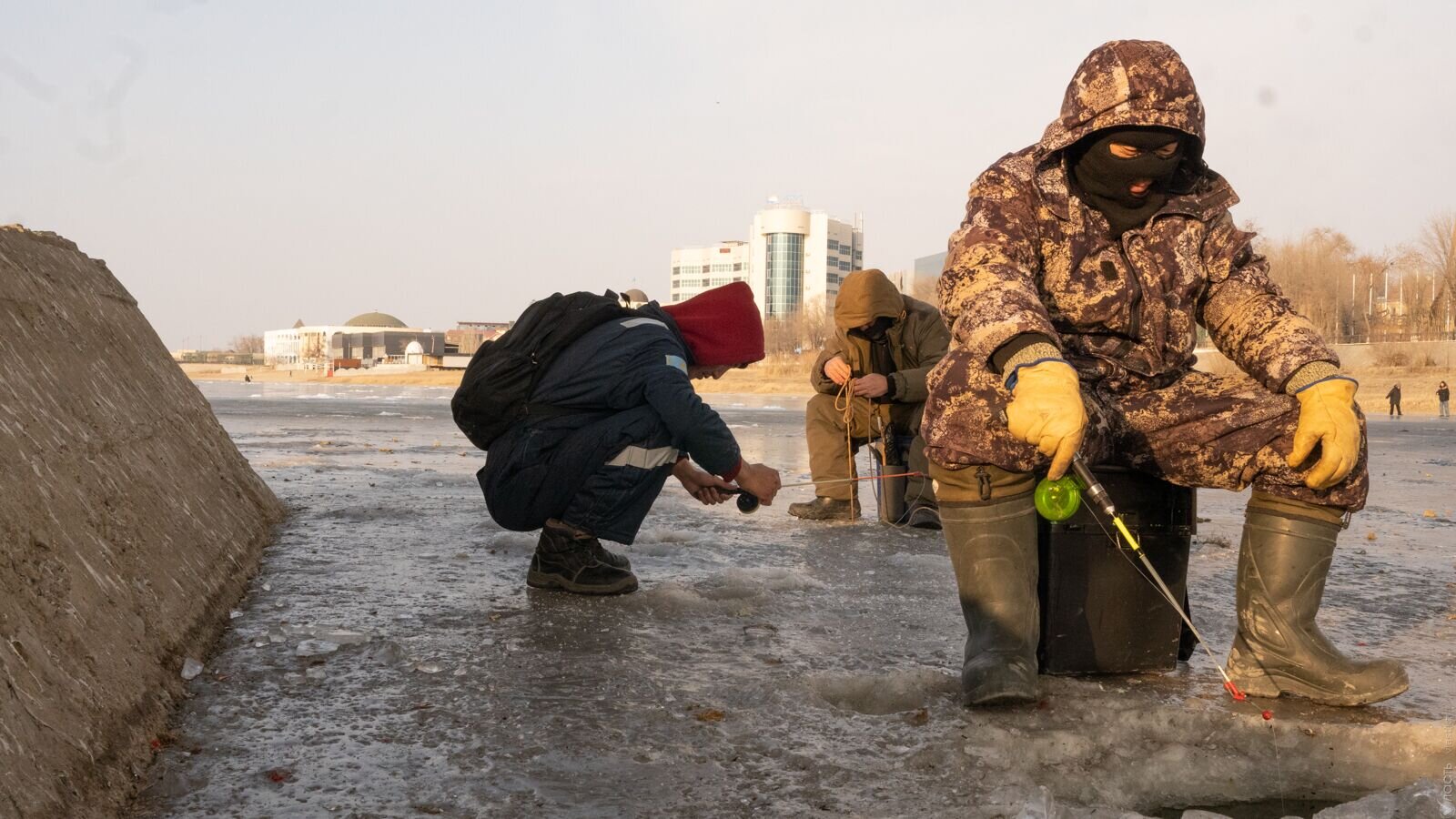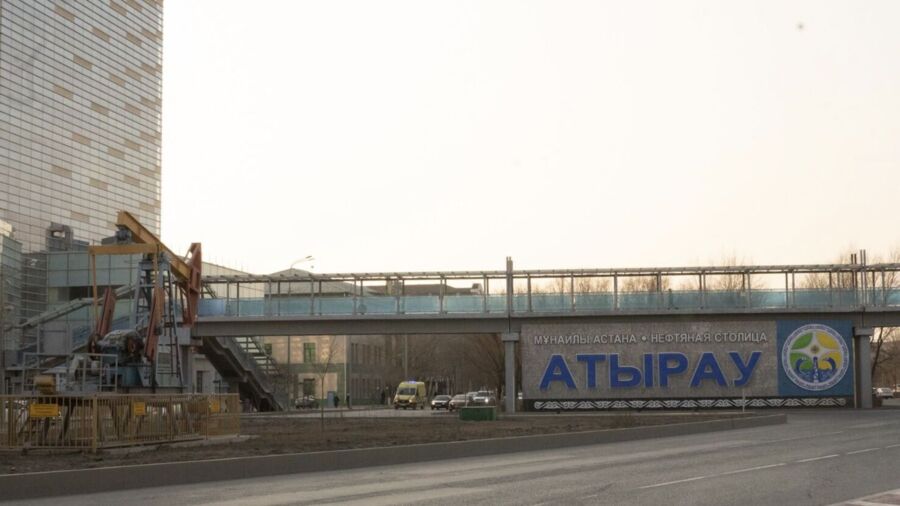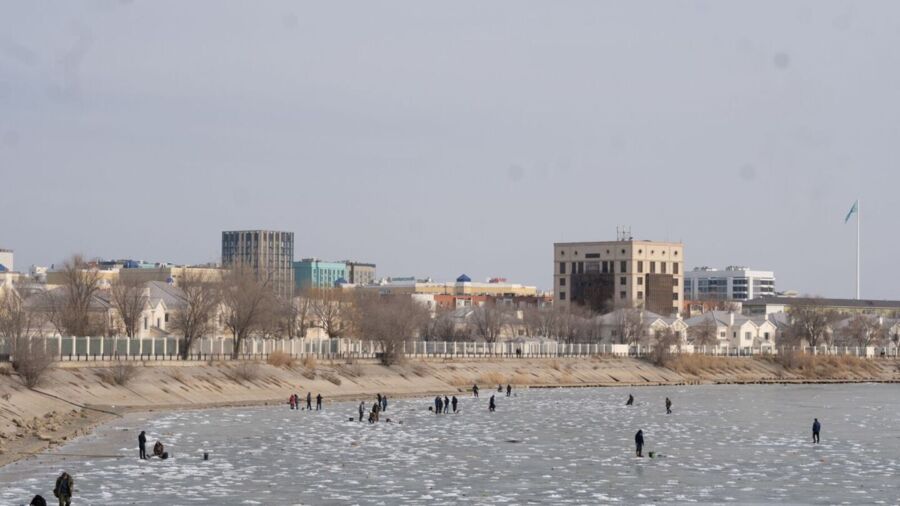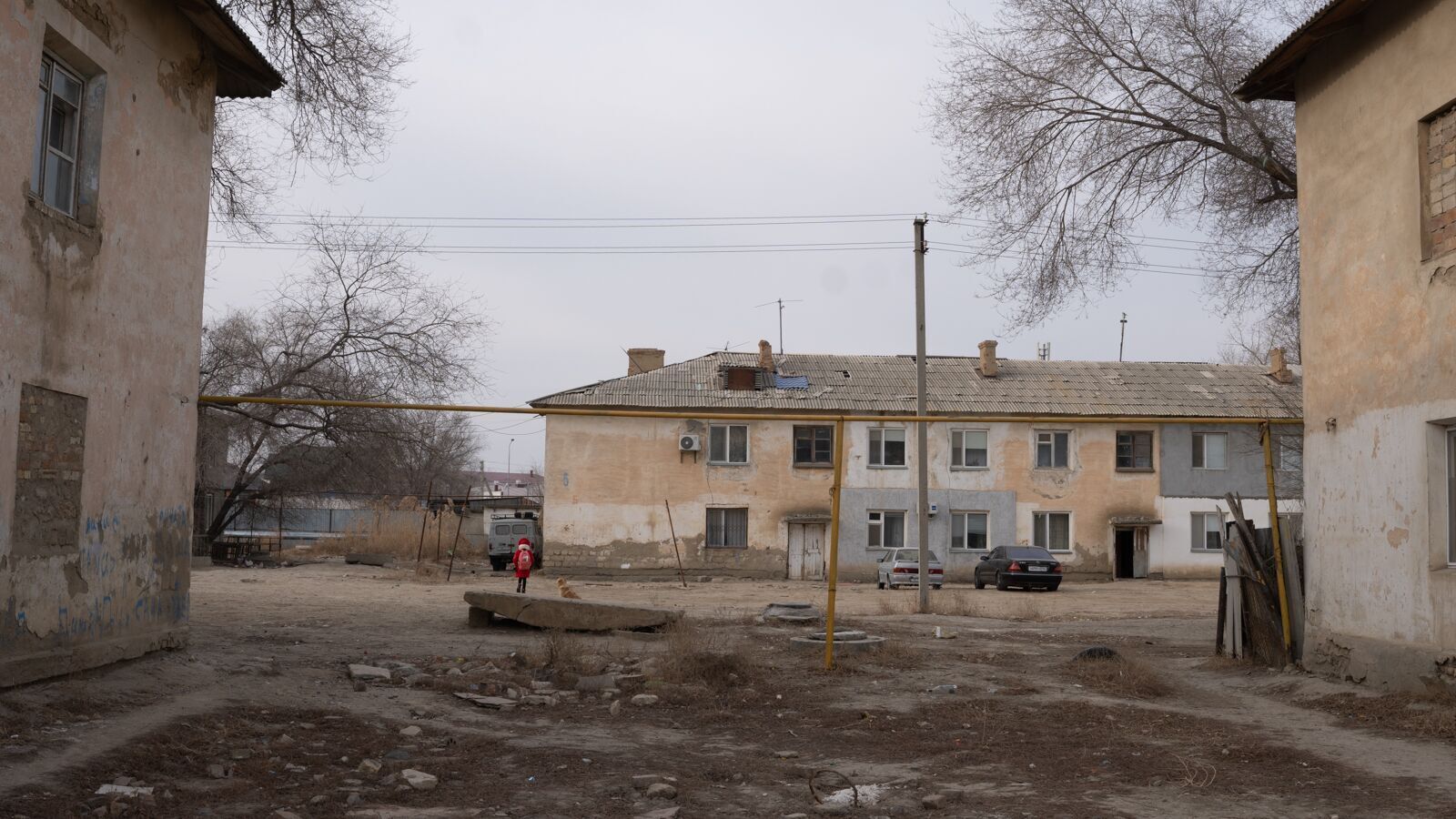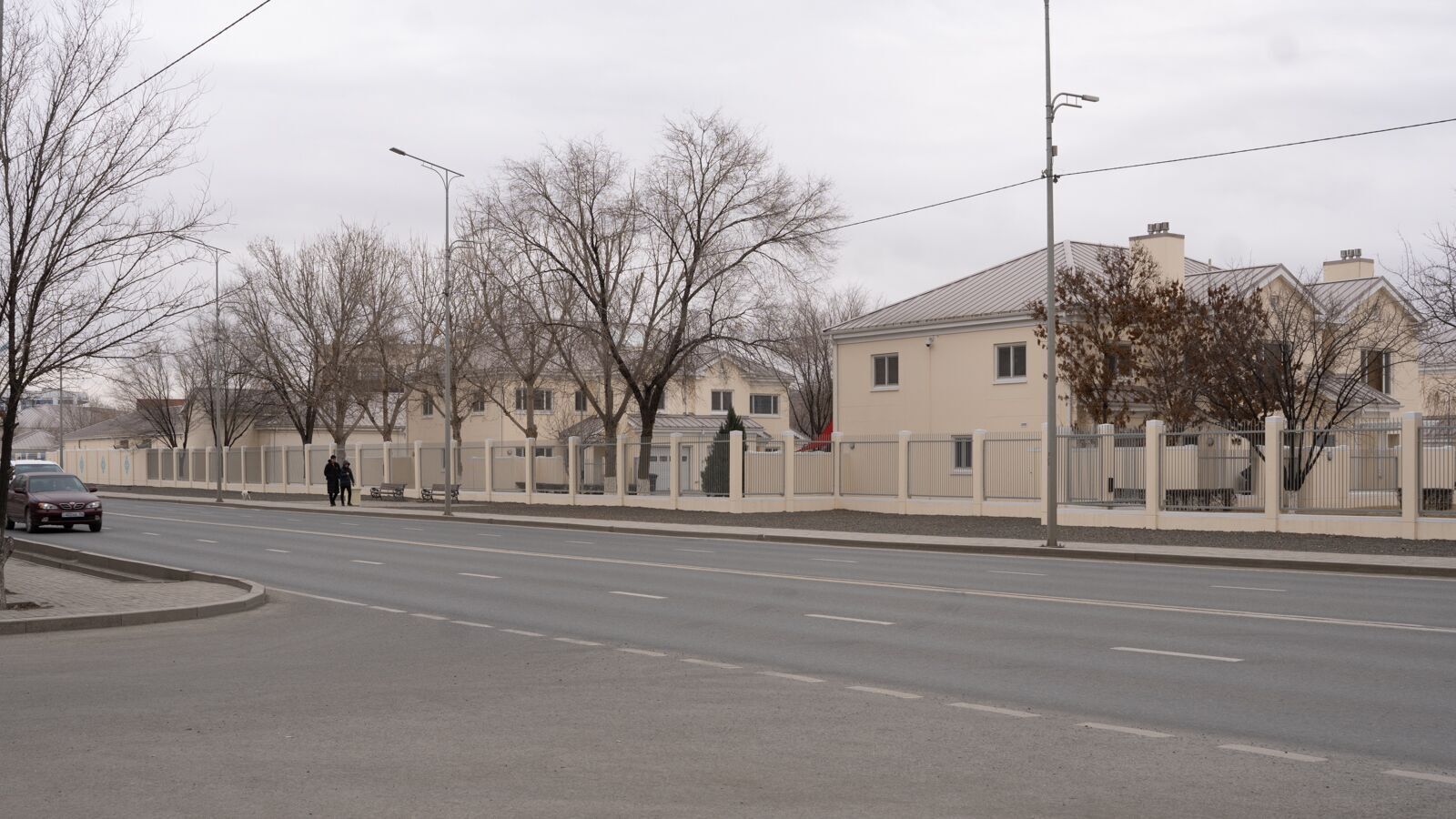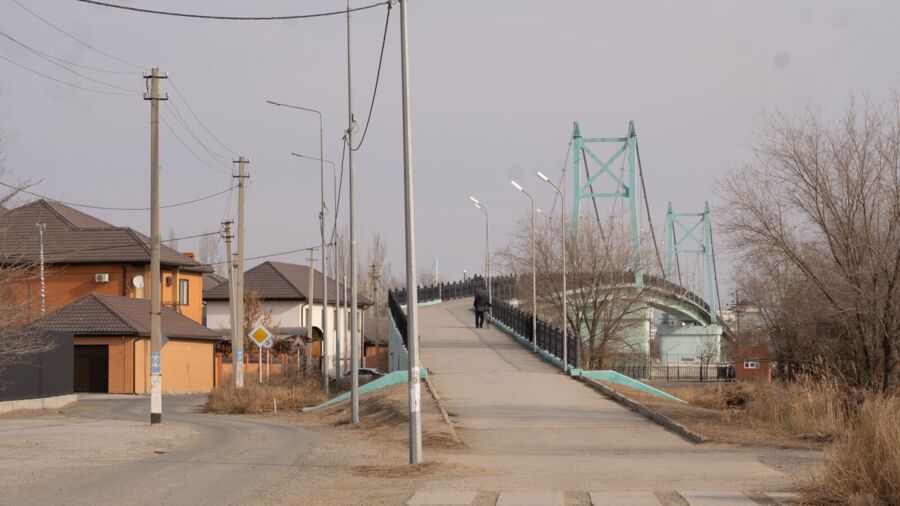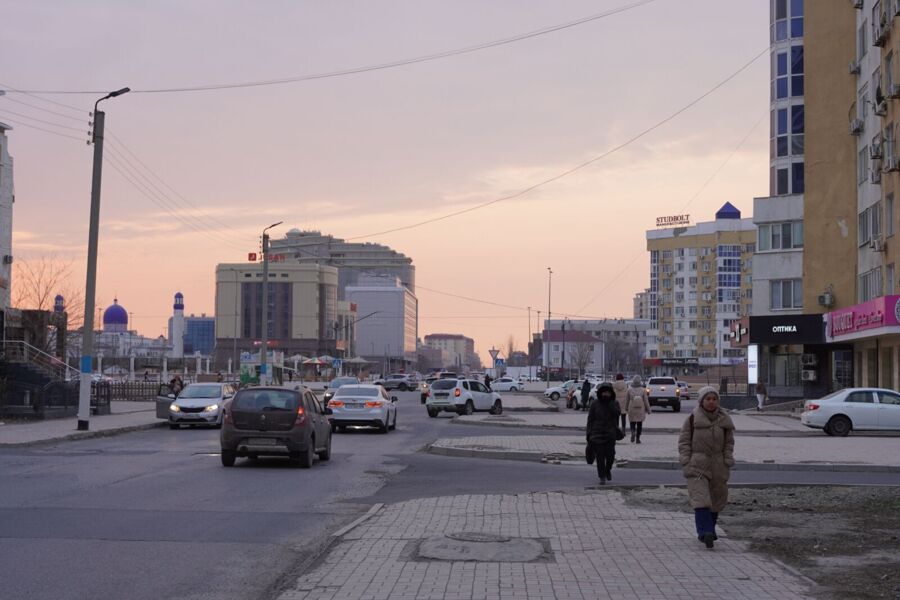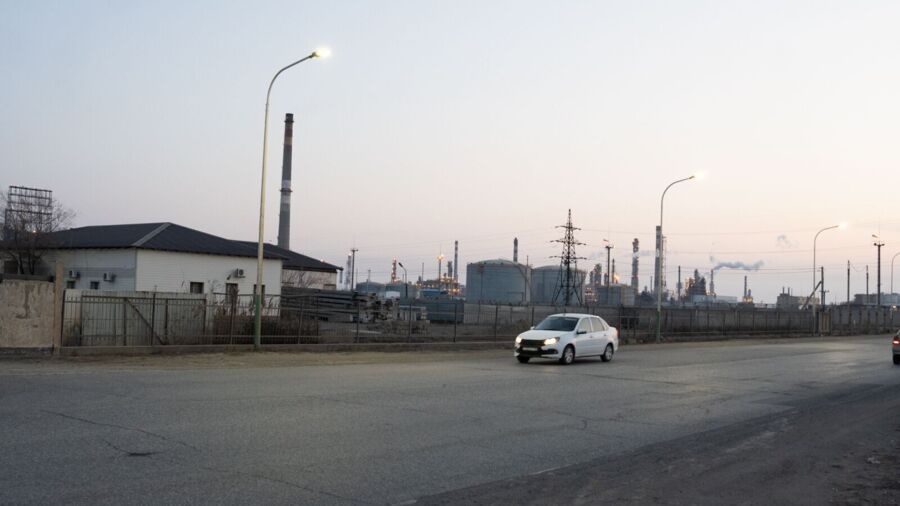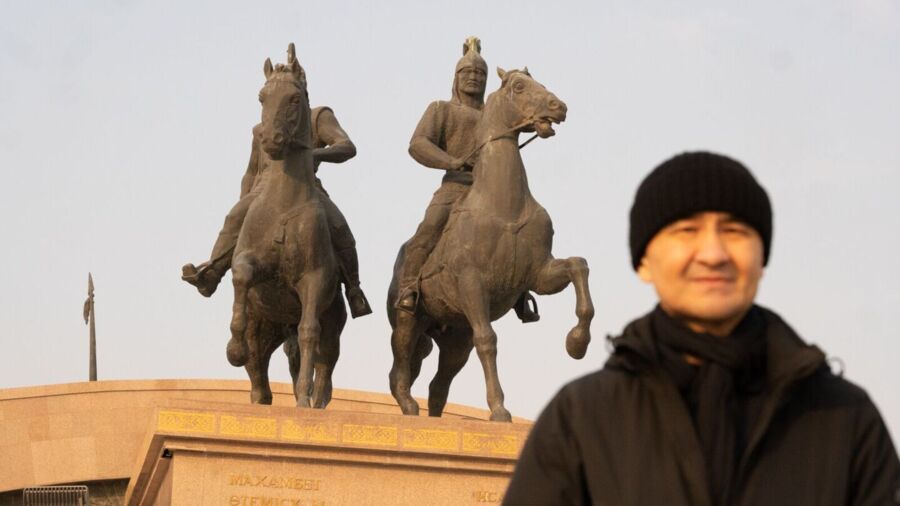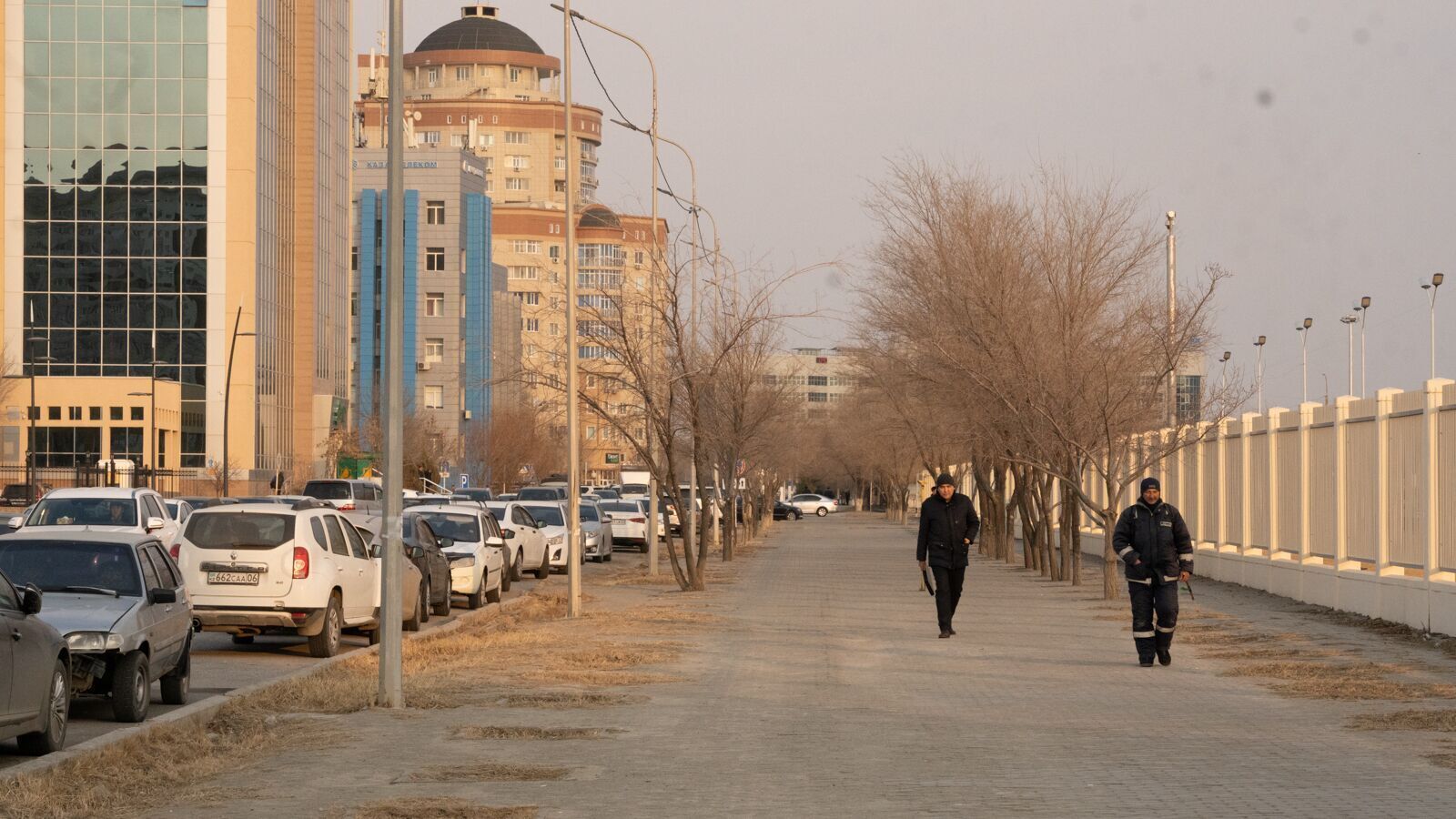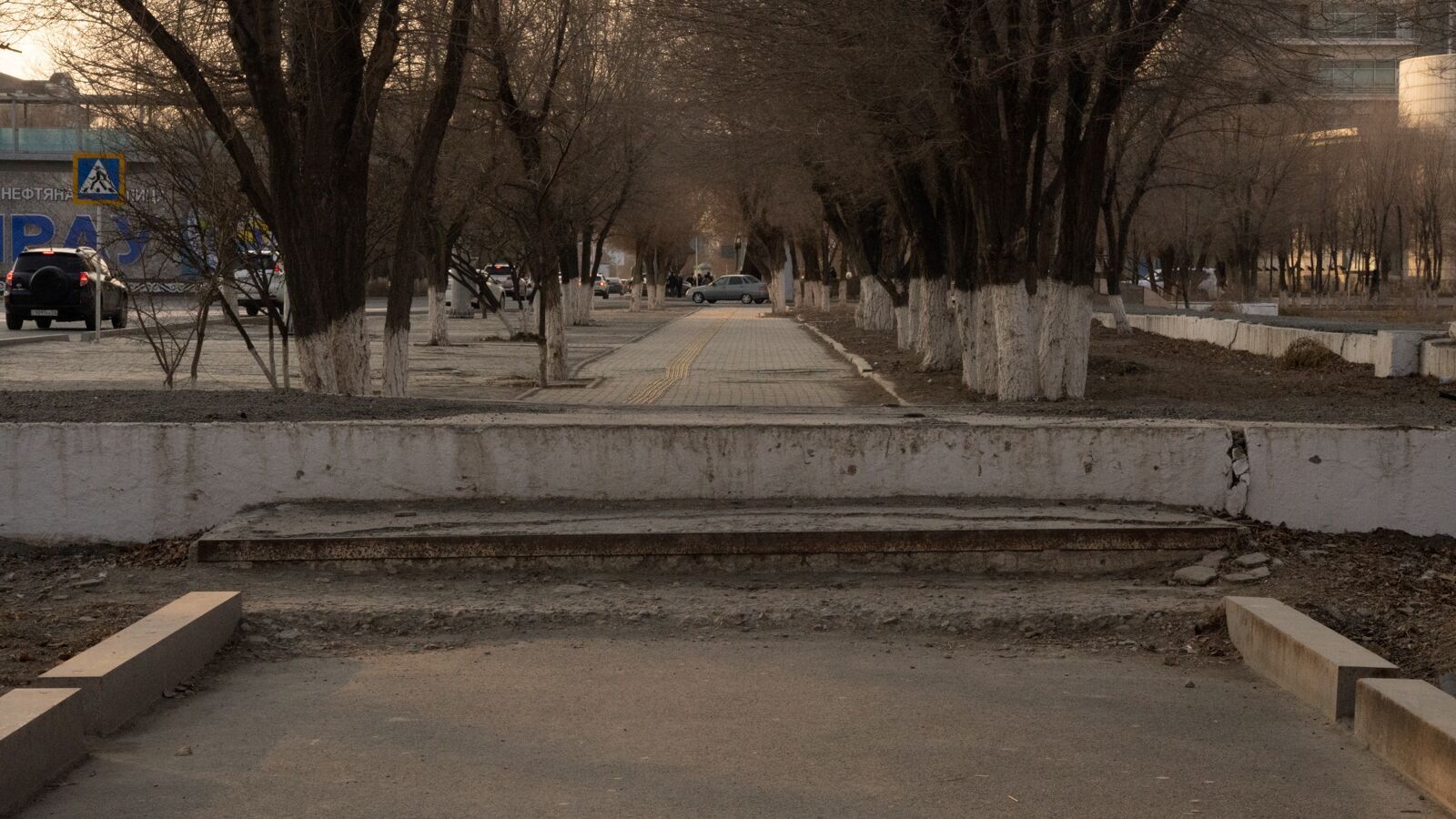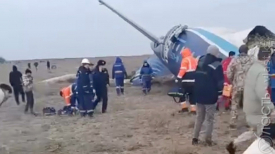In the beginning of April, Atyrau was covered by a thick layer of smog. Schoolchildren were sent to distance learning, and inhabitants were advised to spend less time outside. The reason for the smog was wildfires burning up nearby reeds and peat and emissions from the petrol industry.
Atyrau has long been known for its ecological problems. There is also an insufficiency of potable water and urban infrastructure in the city and throughout the region. A socio-economic malaise afflicts the local population.
All of these problems should be alien to a city dubbed the “petroleum capital” of Kazakhstan. In 2021, the Atyrau region was once again the main hydrocarbon-producing region of the country, extracting more than half of Kazakhstan’s crude oil and natural gas.
Shift Workers’ Free Time and a Frozen River
Atyrau’s main wintertime attraction is by no means the fake oil pumpjack in the city center near the central bridge over the Zhaiyk river that divides the city between “east” and “west”, Europe and Asia. There, on the frozen river also known as the Ural, fishermen sit day and night on top of their containers, where they stack whatever remaining shoaling fish they can catch. Some of them are shift workers with nothing else to do during their free time, off the oil fields.
“I’m from the village of Makhambet, I moved to Atyrau two years ago. We’ve caught fish since childhood. Now there are very few fish. But this is my favorite activity in Atyrau. Wherever the fish are, we go there. It’s a passion. When you catch something, you are happy because you can take it home and eat,” says Eldar Gazizov, tugging on his fishing line.
Gazizov is a warehouse worker for a subcontracting company that provides services to Tengizchevroil, a transnational joint venture. He works 14-day shifts. He claims that it is easy to settle down at an oil company if you are knowledgeable and have job experience.
“Atyrau is developing now. It’s not like it was before. When I was a student there was nothing here. Oil feeds us here. Look around, there are many people here from different countries and regions. Everything is oil,” Gazizov said.
Since independence, oil company office buildings have visibly mushroomed across the horizon. One of them towers over the river’s eastern shore – the building that houses the Kashagan project’s North Caspian Operating Company (NCOC).
The “Oil Capital”
On a snowy evening, families, children and young adults go to the frozen river, pushing the fishermen away. Skates and sleds are available for rent along the waterfront. People prefer the frozen river to other public spaces. Signs warning that “crossing the river is prohibited” are not a deterrent.
In the city center, shattered sidewalks are missing crosswalk markings at dangerous intersections.
Nearby, the administrative center has become chaotically overrun with expensive hotels, restaurants, apartment complexes, and buildings serving the petroleum consortia since the early 1990s. The streets are crowded with a great number of police officers, guards in yellow overalls, and utility workers.
Farther along the main road lies the local “American village” – a gated community built just for expat managers who have come here for oil and gas drilling operations. Entrance is prohibited to outsiders; guards even bar journalists from taking pictures. The neighborhood is filled with cottage-like, modest yellow houses with manicured, fenceless lawns.
Isatai and Makhambet Square, with a memorial to its namesakes, lies nearby. Outpourings of people assembled here during protests against amendments to the Land Code in 2016 and the unrest of January 2022. The square regularly fills up with devout Muslims departing from the nearby mosque after lunch-time prayers, especially on Fridays.
“Atyrau generally isn’t bad, the city is developing. But for the young, let’s just say I don’t see many prospects,” says 21-year-old Asan. “The youth here don’t trust the government, we’re trying to make it through business ventures. You need capital for this, but I don’t see the authorities paying any attention. Among my acquaintances, classmates and friends, few of them have found work. The best option is Tengiz.”
Oil: A Panacea or a Curse?
A local named Saparbai sits on a park bench. At this moment, the city is covered with fog and the air is saturated with the smell of ashes.
He says that the best prospects for the locals are to work at an oil company.
“It’s good if you can get a job for 200,000 tenge (around $450) in this city. Another solution is to open your own business, but you need capital, and credit lines come with crazy high interest rates. People from different cities think that we are feasting on caviar here. Even working in the oil industry, where they hand out 500,000 tenge to stay in the oil field for a month, it’s not easy,” said Saparbai.
“You work there and when you get back home you’re fucked up. Probably one in fifty can get a job in Tengiz. But of course, everyone dreams of working there. I have friends there who have two apartments, two cars, the whole family is insured, they even go to the gym for free. And don’t get me started on food. We don’t eat the same food as they do. Everyone wants to go there, but it’s difficult to find a way in,” he bitterly adds.
With this, Saparbai adds that many locals work for subcontracting organizations that pay “pennies.”
According to data reported by the region’s oil companies, Tengizchevroil employs 4,500 full-time workers. NCOC directly employs 3,000, while more than 9,000 work at its Kashagan project through other companies. The Atyrau Oil Refinery refused to provide information about its staff, referring to it as a trade secret. State-owned Embamunaigaz provided data up to 2020, when it employed 4,764 people.
“The money doesn’t justify the labor. You’re paid little. Atyrau residents need about 700,000 tenge ($1,600) a month in order to live well. My wife earns 150,000 ($335), all of it is spent in her commute and lunch. We still have old folks at home, their pension is miserly. And we still have to nurture and raise our children. My children want to leave – the city is suffocating, there’s no work. Despite the large number of oil companies, only their managers live well,” Saparbai shares.
Saparbai, like other locals, would prefer that oil revenues stayed in Atyrau, “even just 80%.” In 2022, companies in the Atyrau region paid 1.7 trillion tenge in taxes ($3.8 billion). Of that, only 181 billion ($400 million) stayed in the region.
Galina Chernova, an ecologist and director of an environmental justice initiative, spoke about the incompatibility of preserving the Caspian Sea’s biodiversity and continuing its oil production activities.
“Because oil is our everything. Oil is our panacea. And we are all witnessing the resource curse that we were warned about. When oil doesn’t belong to the people and [its wealth] isn’t distributed accordingly, then these resources turn into curses because instead of investing in new industrial sectors, in developing our communities, and in supporting small businesses, we [use these funds to] bail out the banks,” said Chernova.
Politics and Activism in Atyrau
We met Max Bokayev, one of Atyrau’s most famous civic activists, in the lobby of the Renaissance hotel. Bokayev spearheaded the 2016 protests and participated in the events of January 2022.
Bokayev was born and raised in Atyrau. He initially pursued a career in business after the fall of the Soviet Union, during the private sector ‘craze’. By 2003, he had decided to become involved in public affairs and founded the NGO Arlan, which focused on Atyrau’s youth and the fight against drug addiction. Bokayev said he was at the forefront when the first ecoactivists and branches of opposition parties were appearing.
“Nobody wanted to go into public service, people were subjected to oppression. Zhumabai Dastanov was one of the first leaders of the People’s Republican Party of Kazakhstan (then-headed by Akezhan Kazhegeldin). They came to his home and beat his son. In addition, going into public service is a refusal of many things - you would have a tough time feeding your family. Here we have the very factor - we have many oil enterprises with foreign participation. If a young person is literate, all he has to do is learn English and at that point he’ll 100% fall into a foreign company. At that time they were seeking to gain local personnel. Why would young people go into public service when they had these prospects?,” laughs Bokayev.
According to him, by 2010 he had become “the public face of the Atyrau Front” and had already conducted protest activities on his own, drawing the interest of the intelligence services all the while.
“I was working in the regional drug dispensary parallel to an organization working on the social rehabilitation of drug addicts. Then the head doctor at this medical organization informed me that the Committee of National Security had come and inquired about me,” says Bokayev.
In 2016, proposed amendments in the Land Code, allegedly allowing foreigners to purchase Kazakh land, led to protests in Atyrau. Bokayev was imprisoned after the mass-protest, accused of ‘inciting social discord’, ‘disseminating false information’, and ‘violating legislation on protest activities’. He was released in February 2021, though he remains under administrative supervision until 2024.
“The guys who came out to the square in 2016 were representatives of small businesses and the employees of oil companies. They all had faced repression. One guy had a business that was completely destroyed, and he couldn’t get a job. Another guy was chased away from his job, his contract expired and they simply wouldn’t renew it. He continued to be engaged in activism. They came up to his wife, who also works for a foreign company, and told her she would also be out of a job if her husband wouldn’t calm down. They have two children. They’ve been having problems at home. Do you see how this is done?” he says.
Bokayev maintains that Atyrau’s civil society has effectively been bombed out and replaced by government imitations.
“Young people collecting money for sick children will often appear on buses. The words ‘citizen activist’ are printed on their jackets. Psychologists call this effect ‘depreciation’. They’ve created a troll factory among us here in order to muddy the activists. A department for the fight against extremism has appeared. They follow around journalists, social activists, and non-residents,” Bokayev shares.
However, Bokayev does not think that civic activity and protests by the population of Atyrau are in decline.
“The monument to Isatai and Makhambet stands here; these are people who fought and perished with weapons in hand. In Soviet times there were mass relocations to Atyrau. Who wasn’t sent here? I studied together with Bulgarians, Crimean Tatars, Crimean Greeks, Ukrainians, Ingush, Germans, and Chechens. It’s hot here in the summer, and in the winter it’s doggedly cold. History and geography have strongly affected us,” he thinks.
In addition, he thinks that mass-production of oil in the region has had an impact on the protests.
“I grew up near a train station. I would go out onto the balcony on the fourth floor and see hundreds of oil tank cars, departing for the west each day. The people here ask the local government: ‘Where’s the money? Where are the sidewalks? Where are the jobs?’. The local government can’t say that there’s no money. People have confidence that if we rally, our demands will be met,” Bokayev adds.
He says that the worker activism that survives in the region today is the same activism from the 2000s, when oil workers began organizing protests. For instance, Bokayev has organized large protests since 2010, after companies cut the so-called “regional multiplier” from labor contracts.
“The oil workers came to me asking for help, and I provided them with legal assistance. I was kept under administrative arrest for seven days in 2010 for those consultations. They said I held an unsanctioned protest.”
In fact, Bokayev recalled a number of real protests in those years.
“Once, just before [former President Nursultan] Nazarbayev’s birthday in July, workers in the Isatai, Makat, and Zhylioi neighborhoods all carried out protest actions. But there is no systematic organization. Independent labor unions have been annihilated - someone is bought off, someone else is intimidated, and then everything is in the authorities’ hands,” Bokayev says.
He also adds that the workers of the Kashagan project, who joined the January 2022 protests and the oil workers' strike at Tengiz, are an example of revamped worker activism.
“They are, generally speaking, representatives of the middle class - they’re technical and white collar workers. They have a stable job, housing, they work for foreign companies, they don’t depend on the government. They’ve all learned the English language. One guy from Dossor made me laugh, he can distinguish the Irish from the English accent,” Bokayev chuckles.
Bokayev adds that he raised questions about reviewing the contracts with the multinational oil companies already in 2009.
“First of all, we need transparent contracts. Three large projects - Kashagan, Tengiz, and Karachaganak, all have contracts with the state that are still closed to the public. We created a coalition to control revenues from oil production in Kazakhstan that nearly 80 NGOs have joined. We participated in the Helsinki Commission in the US senate on this issue. We’ve written, for example, to Tengizchevroil and to the government and they said that it’s a trade secret. That’s the political ping-pong that we’re dealing with,” Bokayev says.
Bokayev thinks that the situation is going to get even more complicated in the short term.
“We will continue to express our opinions, no matter what constraints we may be subjected to,” Bokayev stated.
This article was originally published in Russian and Kazakh. This is an edited version translated by Grant Thieroff. This is one of several stories published by Vlast as part of “Regions of Kazakhstan”, a project that explores the various manifestations of inequality between the regions and large cities of Kazakhstan.
Поддержите журналистику, которой доверяют.
